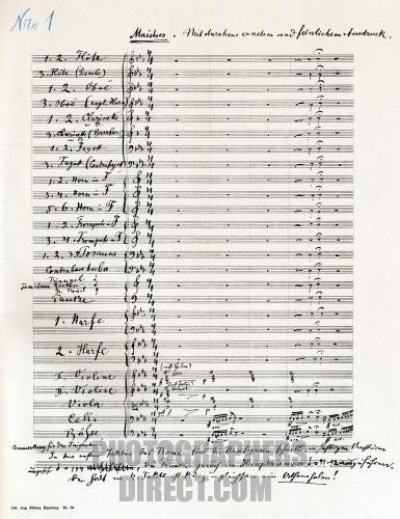Mahler racks up record score
mainThe composer’s finished manuscript of the second symphony sold this morning at Sotheby’s for £3.9 million ($4.5), to which the buyer will have to add a premium of around 15%. The total paid was £4,546,250.
This is by far the highest sum ever paid for a music manuscript. The previous record was held by a Schumann symphony, sold for £1.5 million in 1994.
The Mahler score was owned by Gilbert Kaplan, a New York publisher who conducted the symphony many times around the world.
It was sold to a phone bidder, presently unidentified.






Who let a certain musician touch the score with their bare hands in that video?? Disgusting. You had the common sense and sensitivity to wear gloves Mr Lebrecht.
Did the Kaplan family really need the money? Its a shame. They could have donated or lend it to an institution in Kaplan’s memory. Now, the score will presumably disappear for a long time, stored in some kind of ridiculous ‘shrine’.
Indeed. The irony is, that a manuscript score, after the work has been published, becomes worthless, and only offers some interest in terms of musicology: are there any misprints in the published version against which the MS can be checked? The work itself however, exists then outside the MS.
I’m not sure it’s true that a manuscript becomes worthless after publication. It will depend on the nature and clarity of the manuscript, but in a work of the size of this one there could be a huge number of questionable details in the published version which require clarification from the manuscript. Of course, a facsimile of the manuscript might to just as well. But really people are just buying a ‘piece’ of the composer. More useful then a lock of hair, but the same idea.
“The irony is, that a manuscript score, after the work has been published, becomes worthless”
Oh, but John, what wouldn’t the world give for a Shakespeare manuscript or “foul papers” of any of his published plays? Special pleading, I admit, but still…
With ‘worthless’ I did not mean that the MS would have no intrinsic worth, but no practical worth. The manuscript is the last preparatory sketch before publication, which is the ‘real thing’. It is rather crazy that manuscripts are being sold and bought for furtunes, they should be displayed in museums, or be available for inspection in special libraries, like the British Library. Of course the sentimental worth of manuscripts is something very different from practical worth…
Once I had the chance of studying the MS score of Mahler VII, which was very interesting. Those sudden ‘cuts’ in the music where it seems that something very different suddenly appears, as if the music is ‘cut-off’ with a knife, and something else glued to the seam, well, that appeared to be literally so: Mahler had cut-off halves of pages and glued other pages to it. In this way, a MS can offer insights into the composing process.
I agree, these manuscripts should be in a library. I just hope this manuscript was bought by somebody is very careful and serious and will deposit the manuscript somewhere where it can be looked after in a professional manner.
Is there a facsimile edition available?
Gilbert Kaplan did publish a beautiful facsimile of this manuscript.
Yes, there is a fine facsimile of Mahler VII and its indeed a very interesting manuscript. Although its a fair copy, it nevertheless differs quite a lot from the published score.
Luckiliy, many of Mahler autographs that are in possession of public librarys have been made online recently. For example, the Bavarian State Library has made high-quality-scans of Symphonies 4, 8 and 10, among sketches for No. 6 and 7: https://www.digitale-sammlungen.de/index.html?c=sammlung&projekt=1384445807&l=de
Extremely interesting material, avaiable to everyone.
You are underestimating the practical value of manuscripts to musicians. They can be essential for musicians and musicologists, especially for questions on performance practice. All that obviously is unrelated to their market value.
Estate taxes are still high at that level and $4 million may indeed be needed .
This score might be one of the easier to liquidate portions of the estate for that purpose.
Quite a good point, Robert. Though one does hope that an esteemed financial publisher such as Mr. Kaplan had the wherewithal to provide liquidity to his estate in other ways. Who knows, he may have even directed the gifting of the proceeds. That would have made a great deal of sense with a highly appreciated asset such as this.
Yeah, we’re forgetting that he was a highly knowledgeable about money.
I think we can presume he left a will that clearly established what to do with every asset and we can presume that if this score is being sold it is in accordance with Kaplan’s wishes and neither desperation nor thoughtlessness on the part of his heirs.
Absolutely, the future of the manuscript detailed in the Will.
Another paraphernalia of a dead artist became toy for rich investor. Not sure if there’s much news worthiness beyond that.
Who knows, yet? This might have been purchased by a famous musician, a conductor for example.
Perhaps Norman can describe his experience and emotions in seeing this manuscript, a rather surreal instance of being close to something that Mahler pored over, held in his hands, carried around with him for 16-17 years?